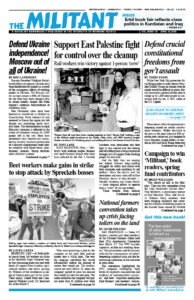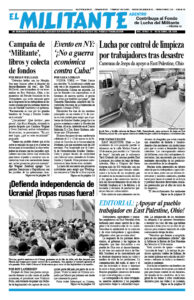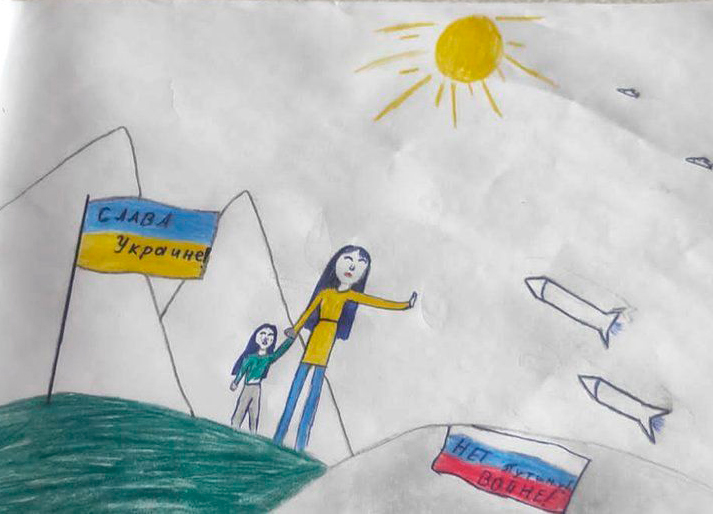Russian President Vladimir Putin’s brutal efforts to conquer Ukraine have been deadlocked for months as a result of the courageous efforts of working people in Ukraine. The Russian rulers occupy almost a fifth of Ukraine but the front lines have changed little in recent months despite the Putin regime’s continual bombardment of residential areas.
Few Ukrainian cities have been bombed as relentlessly as Orikhiv in Zaporizhzhia. Putin claimed he had annexed to Russia the region last fall despite not controlling much territory there. The determination to repel Moscow’s invasion is reflected in the action of volunteers among the 2,000 people left in the city. Most have abandoned their bombed-out homes, having recently finished construction of a massive underground bomb shelter complete with piped water, laundromats, showers, dining facilities and a children’s cinema.
As the war grinds on Putin is being forced to step up repressive measures at home to try to silence anyone who speaks out against the war.
Oleg Orlov was charged March 21 with repeatedly “discrediting Russia’s army.” Orlov was co-chairman of Memorial, an internationally known organization that commemorated victims of Stalinist repression in the former Soviet Union and exposed more recent attacks on political rights. It was shut down by Putin’s regime prior to the war.
After his arrest Orlov’s computer was seized by cops, along with a “No to war” button. His “crime” was publishing an article last November saying, “The bloody war launched by Putin in Ukraine is not only the mass killing of people, the destruction of infrastructure, of the economy, of cultural sites of this wonderful country.”
“It is also the gravest of blows against Russia’s future.”
Hundreds have been charged under Moscow’s wartime censorship laws and 136 jailed. The repression is aimed at instilling fear among working people, but it also fuels deepening distrust of Putin’s regime.
In Yefremov in the Tula region of Russia, 12-year-old Masha Moskaleva drew a picture at school of a Ukrainian woman and her child standing defiantly against approaching Russian missiles in April 2022. A Ukrainian flag had the words “Glory to Ukraine,” and the Russian tricolor was inscribed with the slogan, “No to war!”
School authorities alerted the police who told Masha’s father, Alexei Moskalev, that “he was bringing up his daughter in a bad way,” town councilor Olga Podolskaya told the BBC. He was fined 32,000 rubles ($415).
Earlier this year authorities issued charges against him for “discrediting” the Russian army based on his online posts. Moskalev, a single parent, was placed under house arrest March 1 and Masha was sent to a children’s home, where her father is prevented from speaking to her by phone.
Local residents have been packing court hearings to show their support for the family. One held a sign, “Return Masha to her father!” Moskalev was given a two-year jail sentence March 28.
“Our constitution proclaims freedom of speech, freedom of conscience, total freedom for citizens to express their opinions,” Natalya Filatova, a supporter of the Moskalev family, told the BBC. “But now we’re forbidden from doing that.”
As protests like this continue it’s clear that working people in Ukraine have allies among fellow workers and farmers in Russia, advancing possibilities for building solidarity with the fight to end Putin’s war.
Kyiv law boosts state censorship
At the same time, Ukrainians face assaults on their own freedoms at home by President Volodymyr Zelensky’s government.
A new law attacking freedom of speech and targeting Russian-language speakers was approved by the Ukrainian parliament in December.
It extends government authority that regulates TV and radio broadcasts to cover print media and online news, and gives the government the power to shut down media outlets without a court order. The National Union of Journalists of Ukraine has condemned the law.
The law builds on assaults on the language rights of Russian speakers carried out by the Zelensky government just prior to the war. In January 2022 the government compelled all media outlets to publish in Ukrainian. Media outlets printing in Russian or other languages had to print translations of the equivalent content and volume in Ukrainian. Newsstands had to have over half their publications in Ukrainian. Some 15% of Ukrainians exclusively or mainly speak Russian, and another 25% use Russian along with Ukrainian.
“As a national minority,” the Russian-speaking Ukrainian population have a constitutional “right to receive information and education in their language,” said Vsevolod Rechytskyi, chairperson of the Kharkiv Human Rights Protection Group.
The Kyiv government has also removed millions of mainly Russian-language books from libraries. All attacks on language rights cut across prospects for forging solidarity between working people in Ukraine and Russia.
Inside Russia, the Putin regime’s assault on rights has not prevented labor struggles. Recently, 1,500 road construction workers on the M-12 highway between Nizhny Novgorod and Chuvashia went on strike because they haven’t been paid since Jan. 10. Their action forced the Chinese parent firm of the Russian contractors they work for to pay up.
The M-12 toll motorway is meant to be a link in what could be a Europe-Western Chinese transport corridor under Beijing’s Belt and Road scheme. Two and a half years ago, hundreds rallied in Kazan protesting the proposed route that divides their villages, pollutes their water and damages forests.


